Ditapis dengan
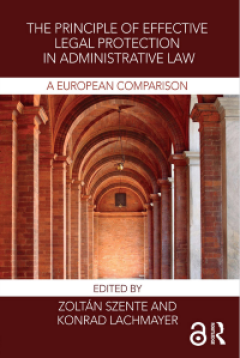
The Principle of Effective Legal Protection in Administrative Law: A European…
This collection presents a comparative analysis of the principle of effective legal protection in administrative law in Europe. It examines how European states consider and enforce the related requirements in their domestic administrative law. The book is divided into three parts: the first comprises a theoretical introductory chapter along with perspectives from International and European Law;…
- Edisi
- -
- ISBN/ISSN
- 978-1-315-55397-9
- Deskripsi Fisik
- 416 hlm.
- Judul Seri
- -
- No. Panggil
- -
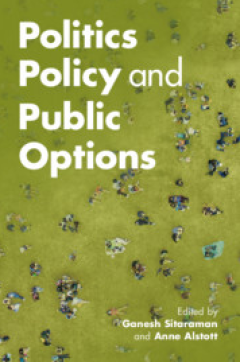
Politics, Policy, and Public Options
A public option is a government-provided social good that exists alongside a similar privately provided good. While the public option is typically identified with health care policy, public options have been a longstanding feature of American life in a variety of sectors, ranging from libraries to swimming pools. Public schools, for example, coexist alongside private schools. However, there is …
- Edisi
- -
- ISBN/ISSN
- 978-1-108-76755-2
- Deskripsi Fisik
- 186 hlm.
- Judul Seri
- -
- No. Panggil
- -
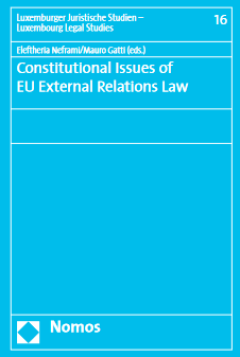
Constitutional Issues of EU External Relations Law
The present book invites the reader to rethink some questions raised in EU external relations law in the light of recent developments in the case law of the Court of Justice, from the perspective of the constitutional foundations of the Union. The various chapters invite the reader to take a look at the balance between the specific legal regime for EU external action and the constitutional fund…
- Edisi
- -
- ISBN/ISSN
- 978-3-8452-7713-4
- Deskripsi Fisik
- 452 hlm.
- Judul Seri
- -
- No. Panggil
- -
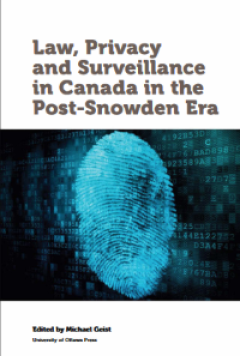
Law, Privacy and Surveillance in Canada in the Post-Snowden Era
Years of surveillance-related leaks from US whistleblower Edward Snowden have fuelled an international debate on privacy, spying, and Internet surveillance. Much of the focus has centered on the role of the US National Security Agency, yet there is an important Canadian side to the story. The Communications Security Establishment, the Canadian counterpart to the NSA, has played an active role i…
- Edisi
- -
- ISBN/ISSN
- 978-0-7766-2183-8
- Deskripsi Fisik
- 298 hlm.
- Judul Seri
- -
- No. Panggil
- -

The Future of the Law of the Sea: Bridging Gaps Between National, Individual …
It explores the diverse phenomena which are challenging the international law of the sea today, using the unique perspective of a simultaneous analysis of the national, individual and common interests at stake. This perspective, which all the contributors bear in mind when treating their own topic, also constitutes a useful element in the effort to bring today’s legal complexity and fragmenta…
- Edisi
- -
- ISBN/ISSN
- 978-3-319-51274-7
- Deskripsi Fisik
- 278 hlm.
- Judul Seri
- -
- No. Panggil
- -

Handbook of Energy Law in the Low-Carbon Transition
The low-carbon transition is ongoing everywhere. This Handbook, written by a group of senior and junior scholars from six continents and nineteen countries, explores the legal pathways of decarbonisation in the energy sector. What emerges is a composite picture. There are many roadblocks, but also a lot of legal innovation. The volume distils the legal knowledge which should help move forward t…
- Edisi
- -
- ISBN/ISSN
- 978-3-11-075240-3
- Deskripsi Fisik
- 618 hlm.
- Judul Seri
- -
- No. Panggil
- -

The Routledge Handbook of Law and the Anthropocene
The Routledge Handbook of Law and the Anthropocene provides a critical survey into the function of law and governance during a time when humans have the power to impact the Earth system. The Anthropocene is a “crisis of the earth system.” This book addresses its implications for law and legal thinking in the twenty-first century. Unpacking the challenges of the Anthropocene for advocates o…
- Edisi
- -
- ISBN/ISSN
- 978-1-003-38808-1
- Deskripsi Fisik
- 386 hlm.
- Judul Seri
- -
- No. Panggil
- -

Handbook Industry 4.0: Law, Technology, Society
The handbook presents an overview of Industry 4.0 and offers solutions for important practical questions. The law and its current challenges regarding data assignment (who owns the data? / EU guidelines), data security, data protection (General Data Protection Regulation), cyberattacks, competition law (right to access vs. monopolists, permissible and prohibited exchanges of information, possib…
- Edisi
- -
- ISBN/ISSN
- 978-3-662-64448-5
- Deskripsi Fisik
- 1221 hlm.
- Judul Seri
- -
- No. Panggil
- -
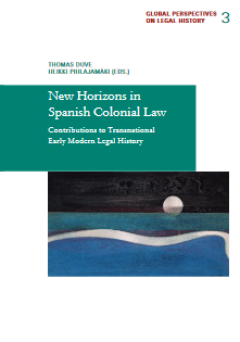
New Horizons in Spanish Colonial Law: Contributions to Transnational Early Mo…
Spanish colonial law, derecho indiano, has since the early 20th century been a vigorous subdiscipline of legal history. One of great figures in the field, the Argentinian legal historian Víctor Tau Anzoátegui, published in 1997 his Nuevos horizontes en el estudio histórico del derecho indiano. The book, in which Tau addressed seminal methodological questions setting tone for the discipline�…
- Edisi
- -
- ISBN/ISSN
- 978-3-944773-12-4
- Deskripsi Fisik
- 272 hlm.
- Judul Seri
- -
- No. Panggil
- -
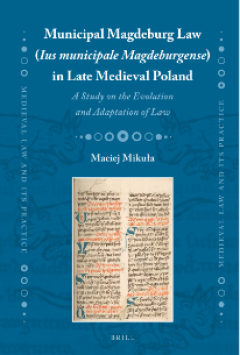
Municipal Magdeburg Law (Ius municipale Magdeburgense) in Late Medieval Polan…
In this book, Maciej Mikuła analyses the extant texts of the Ius municipale Magdeburgense, the most important collection of Magdeburg Law in late medieval Poland. He discusses the different translation traditions of the collection; the application of Magdeburg Law in cities; how differences between the versions could affect the application of the rights; and how the invention of printing influ…
- Edisi
- -
- ISBN/ISSN
- 978-90-04-45619-8
- Deskripsi Fisik
- 491 hlm.
- Judul Seri
- -
- No. Panggil
- -
 Karya Umum
Karya Umum  Filsafat
Filsafat  Agama
Agama  Ilmu-ilmu Sosial
Ilmu-ilmu Sosial  Bahasa
Bahasa  Ilmu-ilmu Murni
Ilmu-ilmu Murni  Ilmu-ilmu Terapan
Ilmu-ilmu Terapan  Kesenian, Hiburan, dan Olahraga
Kesenian, Hiburan, dan Olahraga  Kesusastraan
Kesusastraan  Geografi dan Sejarah
Geografi dan Sejarah